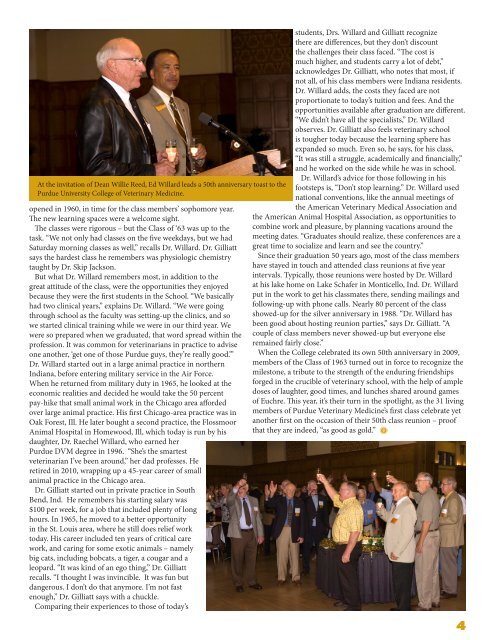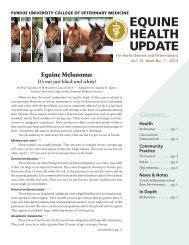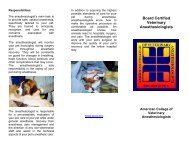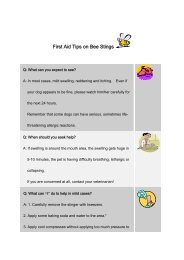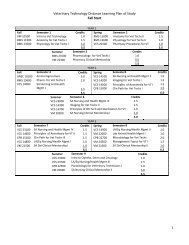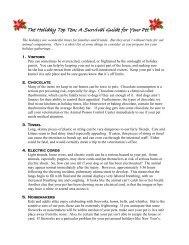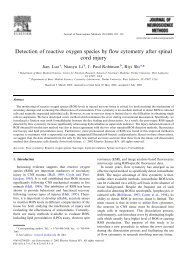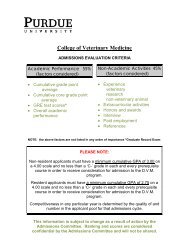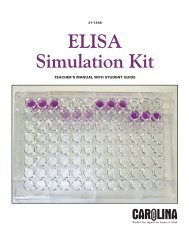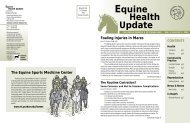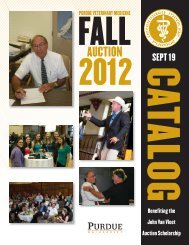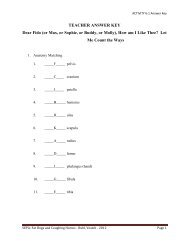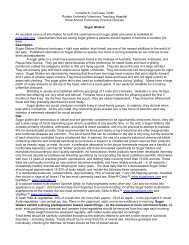2013 PVM Report - Purdue University School of Veterinary Medicine
2013 PVM Report - Purdue University School of Veterinary Medicine
2013 PVM Report - Purdue University School of Veterinary Medicine
Create successful ePaper yourself
Turn your PDF publications into a flip-book with our unique Google optimized e-Paper software.
At the invitation <strong>of</strong> Dean Willie Reed, Ed Willard leads a 50th anniversary toast to the<br />
<strong>Purdue</strong> <strong>University</strong> College <strong>of</strong> <strong>Veterinary</strong> <strong>Medicine</strong>.<br />
opened in 1960, in time for the class members’ sophomore year.<br />
The new learning spaces were a welcome sight.<br />
The classes were rigorous – but the Class <strong>of</strong> ‘63 was up to the<br />
task. “We not only had classes on the five weekdays, but we had<br />
Saturday morning classes as well,” recalls Dr. Willard. Dr. Gilliatt<br />
says the hardest class he remembers was physiologic chemistry<br />
taught by Dr. Skip Jackson.<br />
But what Dr. Willard remembers most, in addition to the<br />
great attitude <strong>of</strong> the class, were the opportunities they enjoyed<br />
because they were the first students in the <strong>School</strong>. “We basically<br />
had two clinical years,” explains Dr. Willard. “We were going<br />
through school as the faculty was setting-up the clinics, and so<br />
we started clinical training while we were in our third year. We<br />
were so prepared when we graduated, that word spread within the<br />
pr<strong>of</strong>ession. It was common for veterinarians in practice to advise<br />
one another, ‘get one <strong>of</strong> those <strong>Purdue</strong> guys, they’re really good.’”<br />
Dr. Willard started out in a large animal practice in northern<br />
Indiana, before entering military service in the Air Force.<br />
When he returned from military duty in 1965, he looked at the<br />
economic realities and decided he would take the 50 percent<br />
pay-hike that small animal work in the Chicago area afforded<br />
over large animal practice. His first Chicago-area practice was in<br />
Oak Forest, Ill. He later bought a second practice, the Flossmoor<br />
Animal Hospital in Homewood, Ill, which today is run by his<br />
daughter, Dr. Raechel Willard, who earned her<br />
<strong>Purdue</strong> DVM degree in 1996. “She’s the smartest<br />
veterinarian I’ve been around,” her dad pr<strong>of</strong>esses. He<br />
retired in 2010, wrapping up a 45-year career <strong>of</strong> small<br />
animal practice in the Chicago area.<br />
Dr. Gilliatt started out in private practice in South<br />
Bend, Ind. He remembers his starting salary was<br />
$100 per week, for a job that included plenty <strong>of</strong> long<br />
hours. In 1965, he moved to a better opportunity<br />
in the St. Louis area, where he still does relief work<br />
today. His career included ten years <strong>of</strong> critical care<br />
work, and caring for some exotic animals – namely<br />
big cats, including bobcats, a tiger, a cougar and a<br />
leopard. “It was kind <strong>of</strong> an ego thing,” Dr. Gilliatt<br />
recalls. “I thought I was invincible. It was fun but<br />
dangerous. I don’t do that anymore. I’m not fast<br />
enough,” Dr. Gilliatt says with a chuckle.<br />
Comparing their experiences to those <strong>of</strong> today’s<br />
students, Drs. Willard and Gilliatt recognize<br />
there are differences, but they don’t discount<br />
the challenges their class faced. “The cost is<br />
much higher, and students carry a lot <strong>of</strong> debt,”<br />
acknowledges Dr. Gilliatt, who notes that most, if<br />
not all, <strong>of</strong> his class members were Indiana residents.<br />
Dr. Willard adds, the costs they faced are not<br />
proportionate to today’s tuition and fees. And the<br />
opportunities available after graduation are different.<br />
“We didn’t have all the specialists,” Dr. Willard<br />
observes. Dr. Gilliatt also feels veterinary school<br />
is tougher today because the learning sphere has<br />
expanded so much. Even so, he says, for his class,<br />
“It was still a struggle, academically and financially,”<br />
and he worked on the side while he was in school.<br />
Dr. Willard’s advice for those following in his<br />
footsteps is, “Don’t stop learning.” Dr. Willard used<br />
national conventions, like the annual meetings <strong>of</strong><br />
the American <strong>Veterinary</strong> Medical Association and<br />
the American Animal Hospital Association, as opportunities to<br />
combine work and pleasure, by planning vacations around the<br />
meeting dates. “Graduates should realize, these conferences are a<br />
great time to socialize and learn and see the country.”<br />
Since their graduation 50 years ago, most <strong>of</strong> the class members<br />
have stayed in touch and attended class reunions at five year<br />
intervals. Typically, those reunions were hosted by Dr. Willard<br />
at his lake home on Lake Schafer in Monticello, Ind. Dr. Willard<br />
put in the work to get his classmates there, sending mailings and<br />
following-up with phone calls. Nearly 80 percent <strong>of</strong> the class<br />
showed-up for the silver anniversary in 1988. “Dr. Willard has<br />
been good about hosting reunion parties,” says Dr. Gilliatt. “A<br />
couple <strong>of</strong> class members never showed-up but everyone else<br />
remained fairly close.”<br />
When the College celebrated its own 50th anniversary in 2009,<br />
members <strong>of</strong> the Class <strong>of</strong> 1963 turned out in force to recognize the<br />
milestone, a tribute to the strength <strong>of</strong> the enduring friendships<br />
forged in the crucible <strong>of</strong> veterinary school, with the help <strong>of</strong> ample<br />
doses <strong>of</strong> laughter, good times, and lunches shared around games<br />
<strong>of</strong> Euchre. This year, it’s their turn in the spotlight, as the 31 living<br />
members <strong>of</strong> <strong>Purdue</strong> <strong>Veterinary</strong> <strong>Medicine</strong>’s first class celebrate yet<br />
another first on the occasion <strong>of</strong> their 50th class reunion – pro<strong>of</strong><br />
that they are indeed, “as good as gold.”<br />
4


